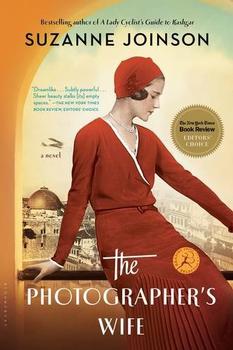Book Club Discussion Questions
In a book club? Subscribe to our Book Club Newsletter and get our best book club books of 2025!
For supplemental discussion material see our Beyond the Book article, What is it Like to Live in Jerusalem? and our BookBrowse Review of The Photographer's Wife.
Please be aware that this discussion guide will contain spoilers!
These discussion questions are designed to enhance your group's discussion about
The Photographer's Wife, a novel about an artist who is forced to confront her past, including family secrets and the political turmoil they caused, when one of her father's former employees tracks her down in the late 1930s.
For Discussion
- The novel's main protagonist is Prue, yet the title refers to Eleanora. Why do you think Joinson made this choice?
- Compare and contrast the way Prue is treated by her father, Eleanor, Ihsan, and the other adults in her life when she is a child. What impact do you think this has on her as she becomes an adult?
- Why do you think Willie lets the canary go in the opening scene?
- Prue recalls that an elderly man once told her, "One should never tell anyone anything, or give information, or pass on stories. Telling is a gift and a gift leads to betrayal." (33) How does this theme play out throughout the novel?
- Why does Prue tell Ihsan about the conversation she overhears between Willie and Eleanor? Do you agree with her assertion at the end of the novel that she's better off not knowing whether Ihsan was using her for information? Why or why not?
- Do you sympathize with Ihsan and the other members of the underground group? Why or why not?
- Prue tells her psychoanalyst, "I would like to make everything secret inside of me public so that there is nothing left in there, festering. That is art." (73) In various scenes, we see Prue as either an artist or a subject. Discuss her mindset in these scenes, how her relationship to art changes throughout her life, and what this reveals about her as a character.
- Discuss the ways in which, for many of the characters in the novel, especially Prue and Willie, emotional discomfort manifests itself in physical ways.
- Do you think Prue is a good mother to Skip? Why or why not? Did your opinion change as the novel progressed?
- Compare and contrast Prue's relationship with Billy and her relationship with Piers. What do you think she sees in each of them? Do you think one of the relationships is better than the other?
- Why does Prue ultimately decide to go see William? What changes her mind? Do you think she regrets her decision?
- What was your reaction to Willie's memory of raping the young girl? Did it change your perception of him? If so, how? Why do you think he seems to feel more shame about punching Eleanora than he does about the rape?
- Willie believes that "the betrayal of a country is nothing compared with human travesties" (116). Do you agree? Why or why not? How does this theme play out throughout the novel?
- Of all the major events that occur in Prue's childhood—the death of her mother, her rape, her giving information to Ihsan among them—which do you think has the biggest impact on her as she becomes an adult?
- Near the end of the novel, Eleanora tells Willie that she could never be with him regardless of her marriage, and describes Khaled as "a steadying force. Without him I would be dead." (318) Were you surprised by Eleanora's decision to stay with Khaled? Why do you think she does? Do you think she is being truthful in her final speech to Willie? Why or why not?
Suggested Reading
A Lady Cyclist's Guide to Kashgar by Suzanne Joinson
A Bitter Truth by Charles Todd
Brideshead Revisited by Evelyn Waugh
The House at Riverton by Kate Morton
Ploughing Sand: British Rule in Palestine, 1917–1948 by Naomi Shepherd
Unless otherwise stated, this discussion guide is reprinted with the permission of Bloomsbury USA.
Any page references refer to a USA edition of the book, usually the trade paperback version, and may vary in other editions.
